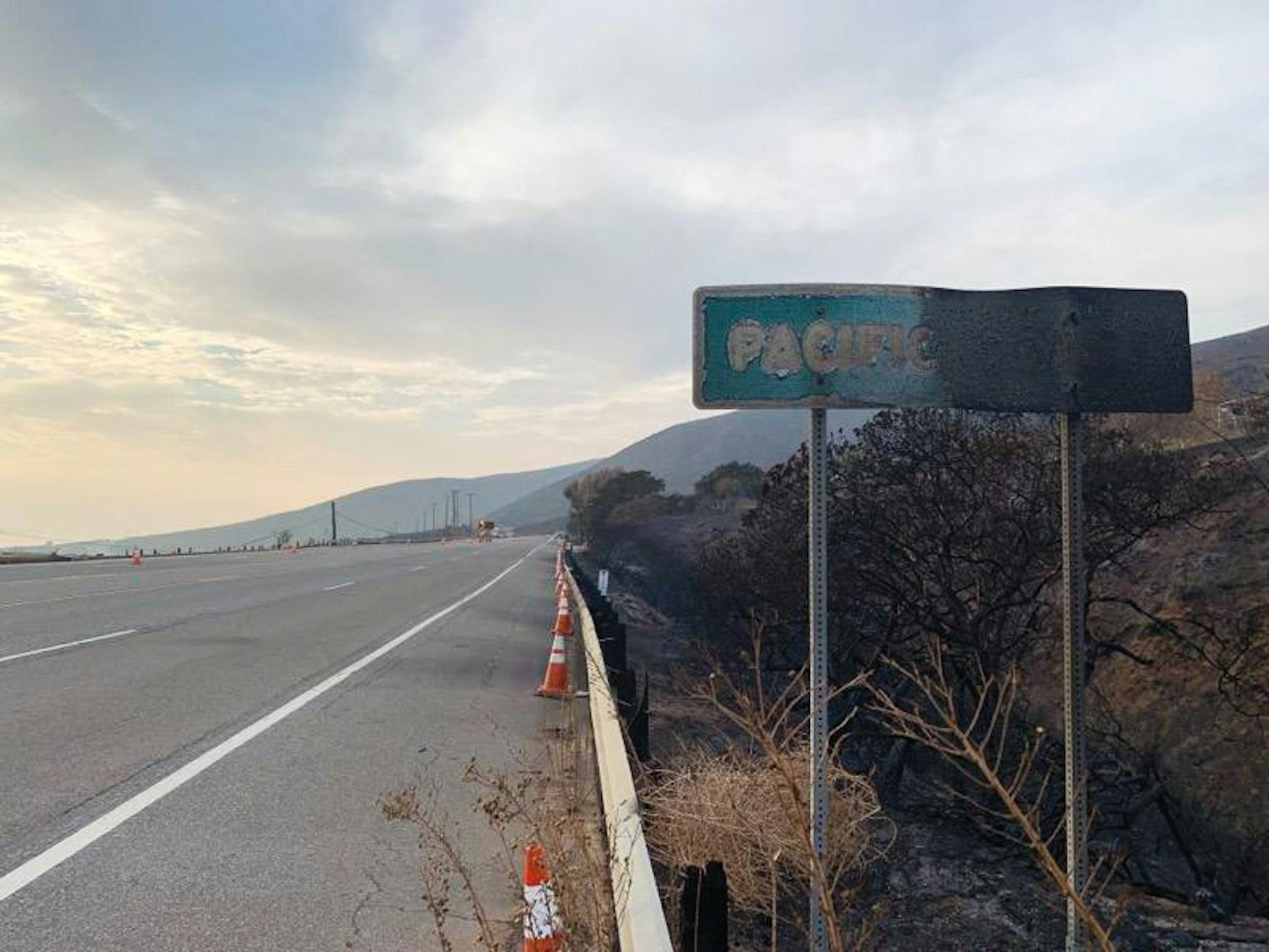In the wake of tragic wildfire, how will Malibu rebuild itself?
When the mythical phoenix first ventures its head above the smolder and ash, it is a little more than an ugly, soot-covered duckling. It waddles two steps forward, falls over, and gets back up. Such is life in the community of Malibu this week as spot fires float over blackened hills, looking for untarnished brush left to consume. The worst is over, and residents trickle back in over singed asphalt to check on homes and belongings, but they are hardly in the clear. By now, the national media has covered in detail the blaze that decimated 713 structures in total, including Miley Cyrus’ mansion and “Westworld” shooting location, Paramount Ranch, according to a Nov. 16 CBS report. The story they will not tell is of the gritty rebuilding of a town that, for thousands of Angelenos, represented a reprieve from the stresses of the everyday.
On Tuesday, Nov. 13th, Tramonto Bistro opened its doors to serve free food to residents and emergency workers who had no power or clean water. Pop-up events around LA on the 13th and 14th offered moral and material support.. During mid-afternoon on the 13th, 21-year-old Tim Morris dangled under the pier of his family’s beachfront restaurant, Paradise Cove, delivering food, diesel generator fuel and other supplies brought in by boat. “They brought half of Costco with them,” he laughed in his Instagram story. Tim and his crew built a crane at the end of the pier to maximize leverage and pull heavy items to shore.
Days before, at nightfall, Tim had fought off flames at the edge of the property with two co-workers and residents of the nearby Paradise Cove mobile home park. There was not much help from the fire crews who were on guard nearby at Pepperdine University, where 800 students remained under a shelter-in-place policy adopted after a 1985 fire, according to a Nov. 13 LA Times article. Lives at stake come first, so the firemen stayed in place while the rest of Malibu burned. “There wasn’t a single fire brigade in West Malibu until maybe 10:30,” Tim explained. “The whole field across the [Pacific Coast Highway] was on fire. Police and firefighters were stopping and saying, ‘You have to leave, this is dangerous. You can’t be doing this.’ But if they weren’t gonna do anything, we had to stay.” Staying behind was not a choice for Tim, but a duty to a community and way of life that he loves.
At the same time that the community banded together, there was a sense of anarchy. Cut off from the rest of Los Angeles, and with police energy focused on controlling major roads, rumors that looters were pillaging evacuated homes spread like wildfire. Gun-toting residents including Carey Hart, spouse of singer P!nk, formed posses and blockaded roads in the wealthy Point Dume neighborhood, posting warnings to Instagram that “looters will be shot on sight.” Actual looting has not been confirmed. Even though robbing evacuees is a despicable crime, the idea of ashen hillside estates patrolled by disorganized posses of gunmen is somehow more post-apocalyptic.
Malibu is prime real estate for many of the rich and famous, and is also home to hippie trailer parks, artists, Pepperdine and several clean living and rehabilitation facilities. At a connected time where the pace of life is ever-accelerating, Malibu was a bastion for the leisure and pleasure of savoring a moment. The coastline of Malibu and the Santa Monica mountains that jut up against it are a haven for surfers, swimmers and cyclists, in addition to motorcycle and car enthusiasts. The latter two groups congregated each day and night at a lookout point known as “The Snake,” with shady trees and miles of visibility. Justin Liew, a senior at NYU who is originally from the area, said that “it wasn’t about the cars or the road, but about the friendships [we] made up there.” With little cell reception, people bumped into each other by chance and everyone’s focus was on those around them. Today, the Snake lookout appears as if it could be a part of the moon’s surface. Liew’s family home survived the fire, but approximately 40 homes in his neighborhood did not.
Rebuilding Malibu will not be easy, but its residents have already taken up the challenge. In Paradise, a town with far fewer resources and no name-brand prestige, the future is a federal matter. Over 7,600 homes have been destroyed in a town that, according to a Nov. 15 BBC article, “will need a total rebuild.” For working-class residents, fire insurance was not a given, even in a log-cabin mountain town, which a Nov. 15 Time article called a “tinderbox.” Residents want to move back home, but 75% of the recovery costs will depend on federal funding, according to the same article. President Trump’s opinions on the California wildfires waver day by day, and his record of natural disaster response is far from pretty. While the hands of residents are shaping a new Malibu, Paradise will need help from a pair of small hands in Washington. While the aftermath of disaster is hardly a time for cheer, the resilient residents and economic autonomy of Malibu will prove to be its greatest assets.




Please note All comments are eligible for publication in The Justice.